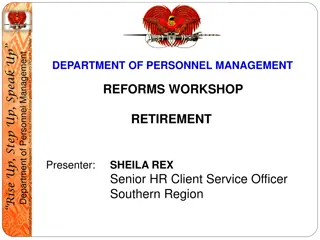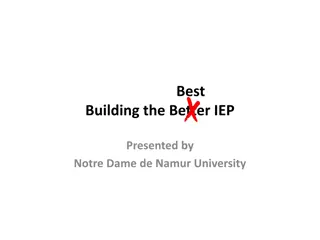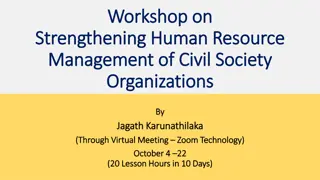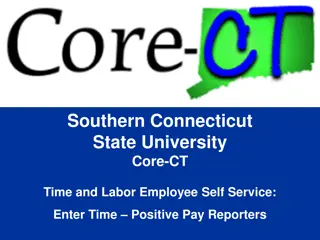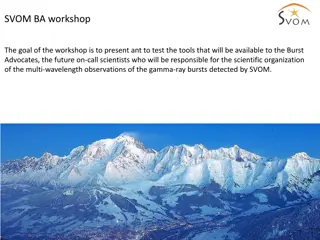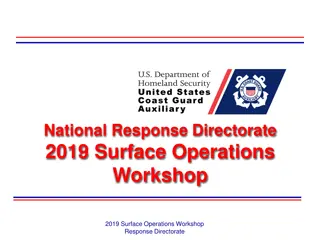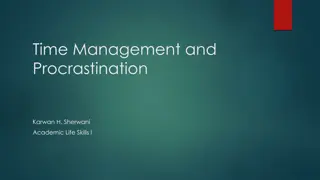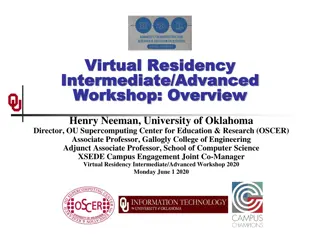
Effective Time Management Strategies for Academic Success
Learn valuable time management techniques to optimize your academic performance, including creating schedules, minimizing distractions, and overcoming procrastination. Discover when and how to allocate time for various tasks, such as attending class, reading, and studying. Take control of your schedule and enhance your attention management skills to boost productivity and reduce stress.
Download Presentation

Please find below an Image/Link to download the presentation.
The content on the website is provided AS IS for your information and personal use only. It may not be sold, licensed, or shared on other websites without obtaining consent from the author. If you encounter any issues during the download, it is possible that the publisher has removed the file from their server.
You are allowed to download the files provided on this website for personal or commercial use, subject to the condition that they are used lawfully. All files are the property of their respective owners.
The content on the website is provided AS IS for your information and personal use only. It may not be sold, licensed, or shared on other websites without obtaining consent from the author.
E N D
Presentation Transcript
TIME MANAGEMENT WORKSHOP B E R K E L E Y L AW AC A D E M I C S K I L L S P R O G R A M S E P T E M B E R 3 0 , 2 0 2 0
WHERE DOES THE TIME GO? Attending class Reading and doing other work for classes Attending office hours Reviewing and outlining Writing out answers to hypos and practice exams Extracurricular activities (student orgs, journals, pro bono, activism, etc.) Personal time/self care Applying for jobs/interviewing Other obligations Stress, anxiety, procrastination
YOUR JOB AS A STUDENT Do the reading Do other work for class Attend class Review/outline (start now and do it regularly) Write out answers to hypos and practice exams Attend office hours if you have questions
WHEN TO DO IT? September October November Reading Week Go to class Read for class Go to office hours if you have questions Create a schedule Read efficiently Begin outlining Write hypo answers Create a work plan Office hours Stick to your schedule Read efficiently Outline Practice exams Office hours Finish outlining Practice exams Create a schedule for the exam period
TIME MANAGEMENT = ATTENTION MANAGEMENT CREATE A SCHEDULE MINIMIZE DISTRACTIONS OVERCOME PROCRASTINATION
CREATE A SCHEDULE Reflect on when and where you study best Break up the day into small chunks of time Include breaks for other obligations Breaks can be meals, movement, relaxing, checking email, etc. Schedule more difficult tasks during your best study times Be realistic
AVOIDING DISTRACTION AND PROCRASTINATION Avoid reinventing your schedule unless it s truly not working; go on autopilot Pomodoro technique: use a timer to to break down work into intervals separated by short breaks. Set specific goals for each small chunk of time. Partner with a friend or study group to set goals and hold each other accountable Be mindful and intentional about how you spend your time When you are in class or studying, leave your phone in a different room. Check it during breaks or only during specific times.
GET TO THE ROOT OF PROCRASTINATION Anxiety about not being good enough or fear of failure Confusion about what the first steps of the task are or how to begin Confusion about how to divide up a large or overwhelming task Confusion about what needs to be done or how to do it
IDENTIFY & ADDRESS WHATEVER IS HOLDING YOU BACK Reflect Check in with yourself and ask: "Why am I avoiding this task?" Get advice Ask your prof or ASP fellow about how to get started, how to divide up the task, a timeline for completion, etc. Organize Use organizational tools such as a to-do list, schedule, calendar, timer, reminders, etc. Repeat Celebrate your successes! Reflect on the process Adjust your process/get more advice as needed
READ EFFICIENTLY oWhy is this case important/helpful? What does it tell us that we didn t already know? oEliminate case briefs; take notes in the notes in the margins oEliminate Quimbee and other aids unless on-call or lost oLess focus on the case itself, more focus on why it is important oWhat can you take from the case that will help you on the exam?
OUTLINING o No magic, not Mt. Everest o Review your class notes and pull out the important stuff what will help you on the exam? o Consider policy o Don t get lost in too many resources o Use another student s outline as a template to get you started, but ultimately create your own outline o An outline is a very personal tool; its value lies solely in how helpful/useful it is to you
WHEN IN DOUBT, PRACTICE! Practice and testing are highly effective learning methods. Passively reviewing/reading information is not. Practice way more than you think! If you are wondering whether you should review your notes or do a hypo, do the hypo First work through practice questions slowly to help you learn the material and develop a systematic approach Later do timed practices to simulate the pressure/adrenaline Compare your answer to a friend s or a sample answer look for IRAC structure and a detailed analysis of the facts
TAKE CARE OF YOURSELF Develop a routine to facilitate good sleep (lots of articles on this) Include movement in your schedule (walk/jog/roll, stretch, yoga, etc.) Schedule time for loved ones and activities that make you happy What will do you do when you feel stressed? Have a plan and write it down. Practice controlled breathing and/or meditate (UCLA has a free app) Practice self-compassion and other self-care strategies Communicate with your friends/family/partner about what you need or what they can do
RESOURCES Berkeley Law Psychologists Dr. Linda Zaruba zaruba@berkeley.edu Dr. Christine Chang ctchang@berkeley.edu Confidential Berkeley Law Student Services 280 Simon Hall 510.643.2744 Not 100% confidential. UCB Counseling Services 2222 Bancroft Way uhs.berkeley.edu/students/counseling 510.642.9494 Confidential Confidential Care Advocate 510.642.1988 http://bit.ly/careadvocate Confidential


